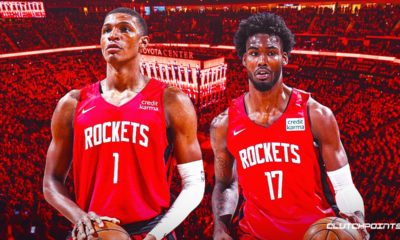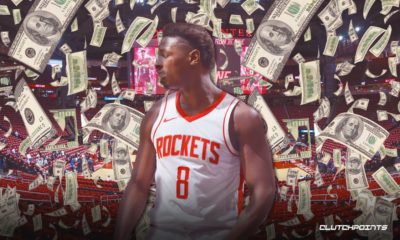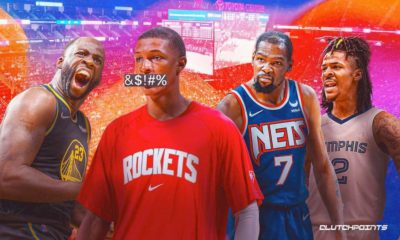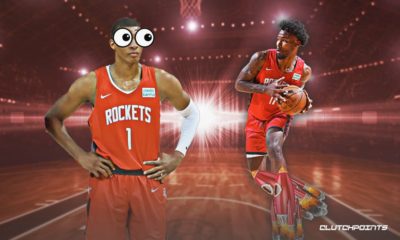Rockets
The top 10 NBA shooting guards of all time: Where does James Harden rank?
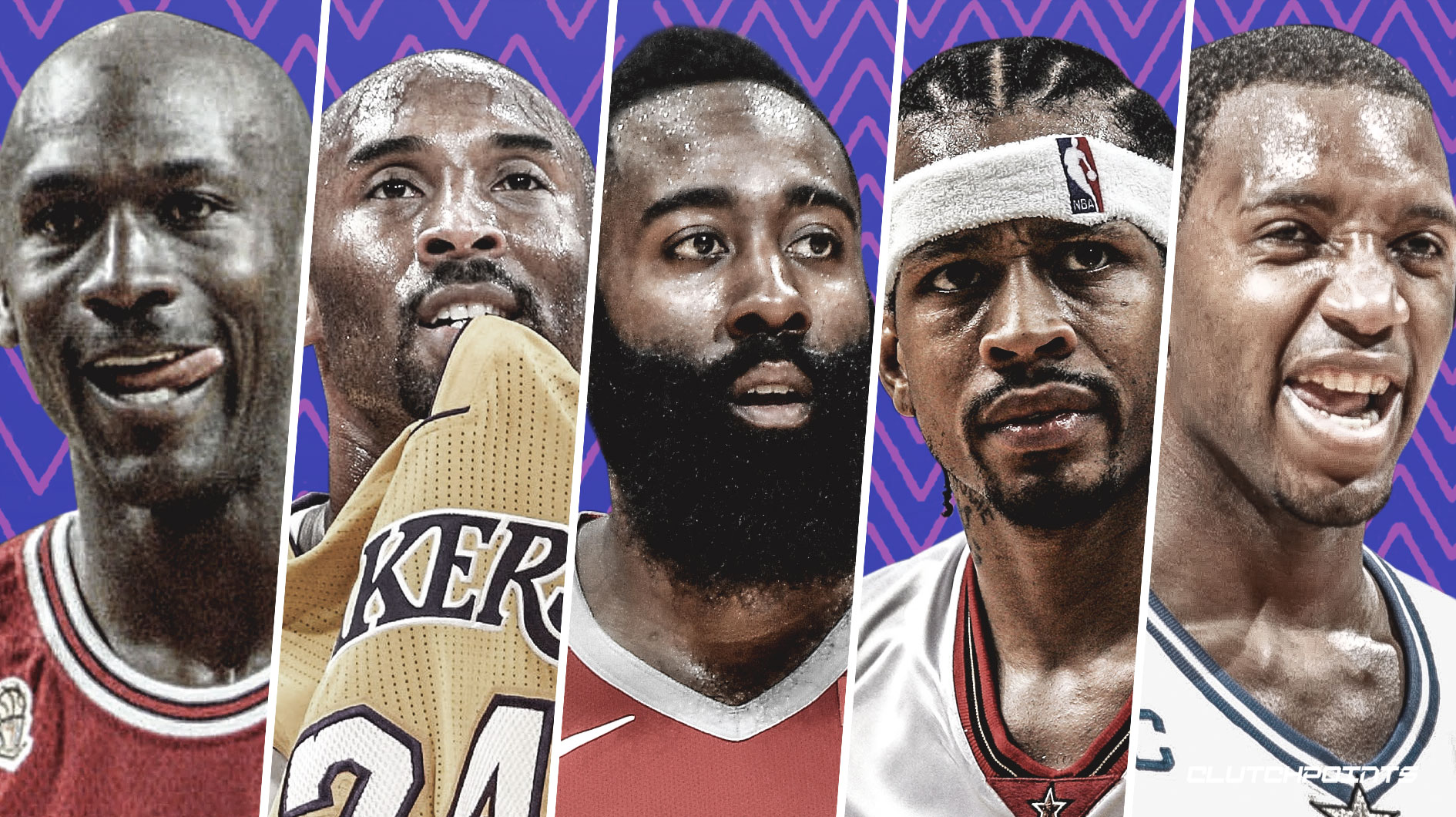
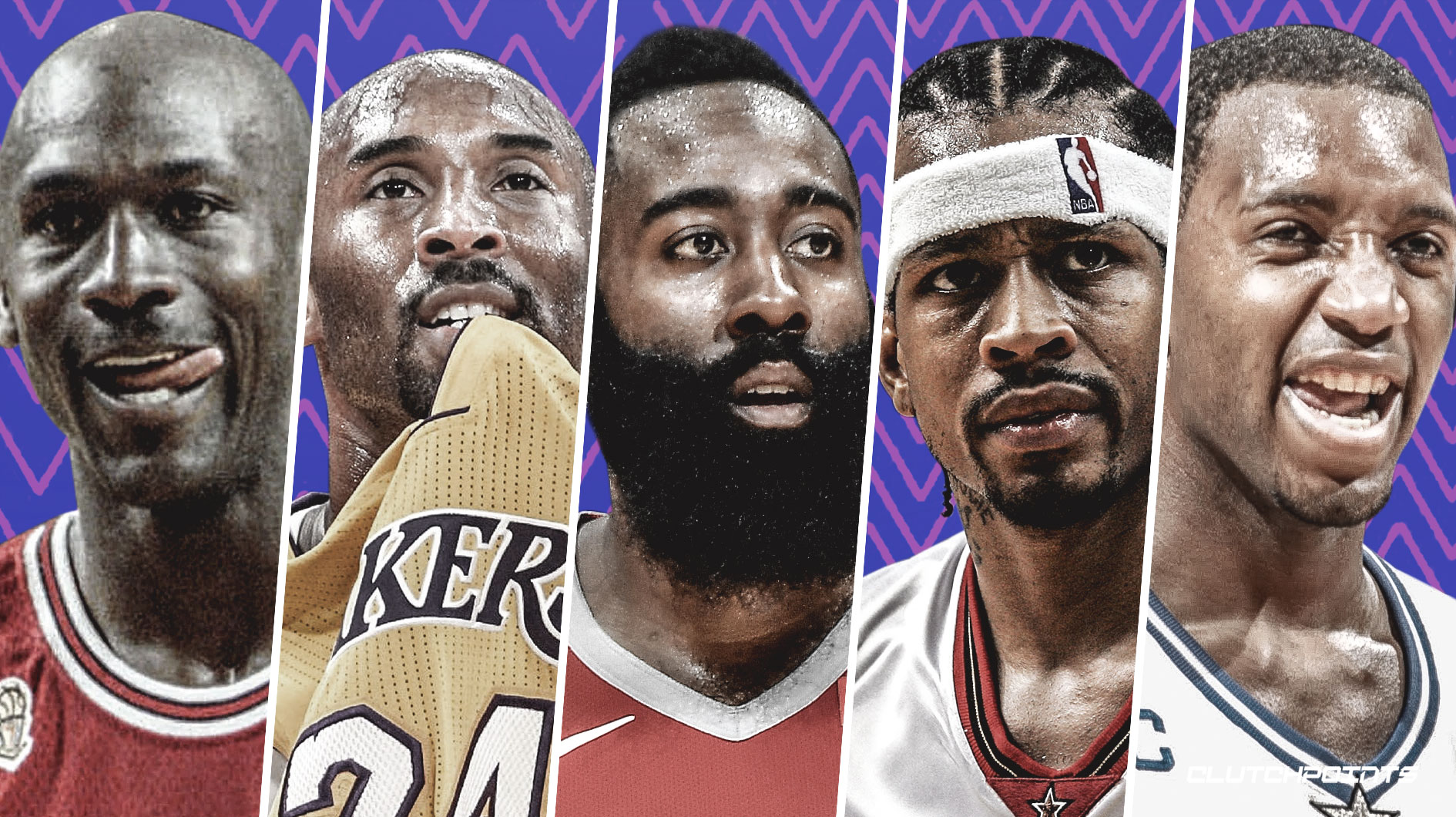
The biggest story of the 2018-19 NBA season so far has been James Harden and his red-hot scoring streak that is being compared to some of the all-time greatest performances ever.
Highlighted by a 61-point performance at Madison Square Garden against the New York Knicks, Harden appears to be getting even better as the season has progressed. The Beard is showing no signs of slowing down on the way to what appears to be another MVP season.
The tear that Harden has been on the past month is nothing short of phenomenal regardless of the rules changes that helped facilitate the increased scoring throughout the league this season. With his 30 points or more streak now tied with Wilt Chamberlain for second in NBA history, is James Harden among the 10 greatest shooting guards of all time? The quick answer is yes.
So where does he now rank among the greats?
Let’s find out!
10. Ray Allen
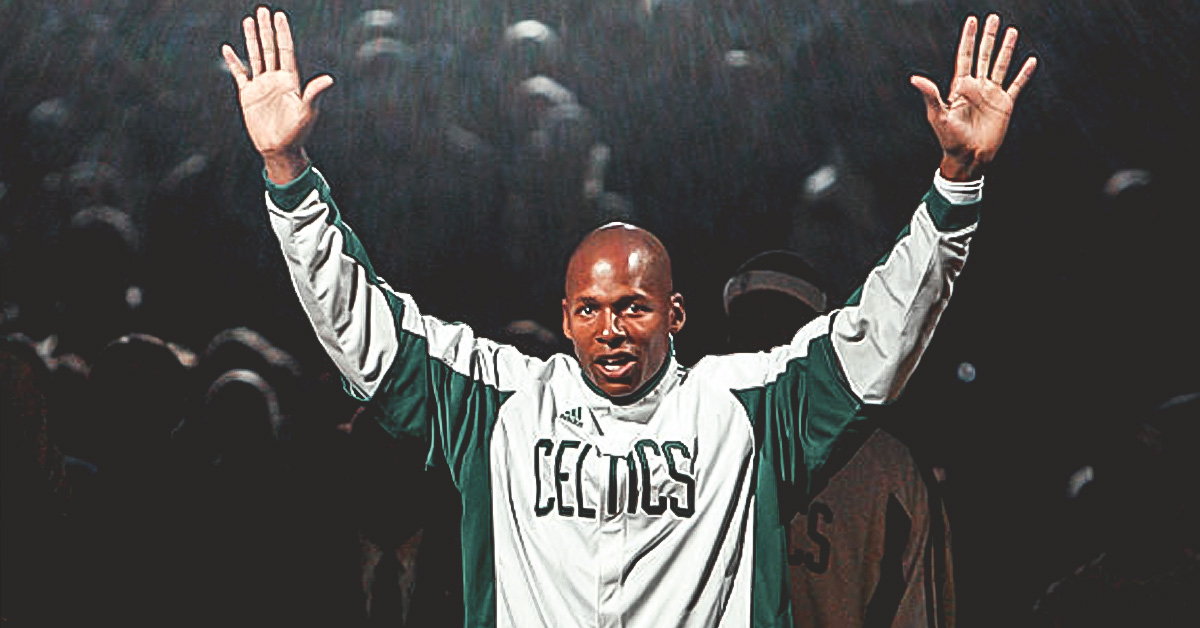
- Career Averages: 18.9 points, 4.1 rebounds, 3.4 assists, 1.1 steals
- Best Statistical Season: (2006-07) 26.4 points, 4.5 rebounds, 4.1 assists, 1.5 steals
- Championships: 2
- MVPs: 0
- Rookie of the Year: No
- All-NBA: 1x 2nd Team, 1x 3rd Team
- All-Star: 10x
- Leaderboards: 3x 3-pt FG-made leader
Ray Allen, one of the best pure shooters in the game is also number one all-time in three-pointers made with 2,973 for his career. He had an all-around game that was everything you could ask for from your shooting guard and more.
For those who didn’t get the opportunity to watch him during his heyday, Allen was an athletic guard who could drive and dunk on nearly anyone. Since he was also deadly from three-point range, defenders didn’t know whether to take away the three-point shot or keep him away from the lane.
Yes, he was that good.
Following his trade from the Milwaukee Bucks to the Seattle Supersonics in the 2002-03 season, Allen enjoyed his best individual seasons. His 24.6 points, 4.6 rebounds, 4.2 assists and 1.3 steals in 296 games for the Sonics are the best stats he’s ever had on the teams he played for.
After a blockbuster trade that brought him to the Boston Celtics, he won a championship as part of the Big Three in 2008 along with Kevin Garnett and Paul Pierce. He won his second championship with the Miami Heat as a role player but one who played a crucial role in the team’s third title.
Who can forget Allen’s iconic three-point shot with seconds to go in Game 6 of the 2013 NBA Finals that prevented the San Antonio Spurs from celebrating on their home floor? That was pure clutch and a testament to his military-like training of taking shots to simulate game-type situations.
His best years individually were with the Seattle Supersonics but Allen was recognized as a winner in the latter part of his career after winning his two titles.
9. Tracy McGrady
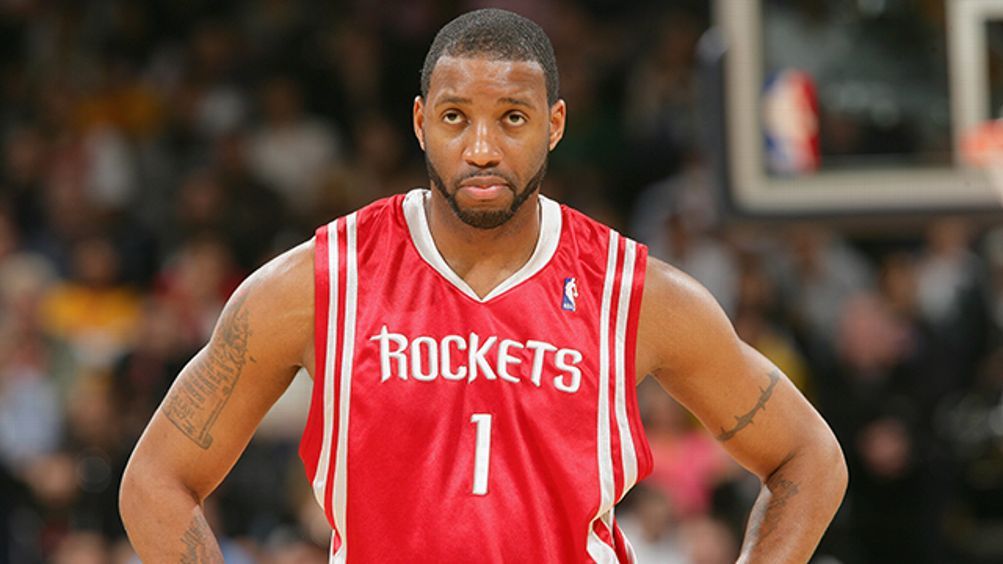
- Career Averages: 19.6 points, 5.6 rebounds, 4.4 assists, 1.2 steals
- Best Statistical Season: (2002-03) 32.1 points, 6.5 rebounds, 5.5 assists, 1.7 steals
- Championships: 0
- MVPs: 0
- Rookie of the Year: No
- Most Improved Player: 1x
- All-NBA: 2x 1st Team, 3x 2nd Team, 2x 3rd Team
- All-Star: 7x All-Star
- Leaderboards: 2x scoring leader
One of the most talented shooting guards ever to grace the hardwood, Tracy McGrady was a sight to behold. At 6-foot-8, he is one of the tallest guards to play the position and with his 7-foot wingspan, he could shoot over almost any opponent.
And shoot he did on the way to two consecutive scoring titles from the 2002-03 season to 2003-04. His career high of 32.1 points per game in the 2003-04 season is one of the 10 highest scoring averages by a shooting guard. Only Michael Jordan, Kobe Bryant, James Harden and George Gervin have averaged more points per game than McGrady.
From 2000-01 to 2006-07, McGrady averaged 26.9 points per game as he routinely battled the best shooting guards in the game including Bryant, Allen Iverson, Ray Allen, Vince Carter and more. In many of these mano-a-mano duels, McGrady distinguished himself as one of the greats in the game. In 2002-03, his 30.3 PER as a shooting guard is topped only by Jordan’s four seasons (1987-88 to 1990-91) and Wade’s 2008-09 season.
That’s how good he was until injuries robbed him of his explosiveness later in his career. T-Mac’s detractors would point to his lack of playoffs experience and the fact that he wasn’t able to carry his team beyond the first round of the playoffs as exhibits A and B as to why he shouldn’t be on this list.
But I say that these only prove that a one-man team can’t carry an entire team past the first round. Many times, McGrady was the only All-Star on his team and no matter how good he was, it was nearly impossible to offset his teammates’ deficiencies.
Perhaps the best barometer for McGrady’s place in history is his recent induction into the Hall of Fame. Despite the stringent voting that has kept many players from making it to the Hall during their first nomination, he is one of the few to make it as a first-time nominee with the Class of 2017. Reggie Miller, now a Hall of Famer as well and one of the best two guards ever, didn’t even make it until his second nomination.
His status as an HOFer reinforced McGrady’s place among the greatest shooting guards in league annals.
8. George Gervin
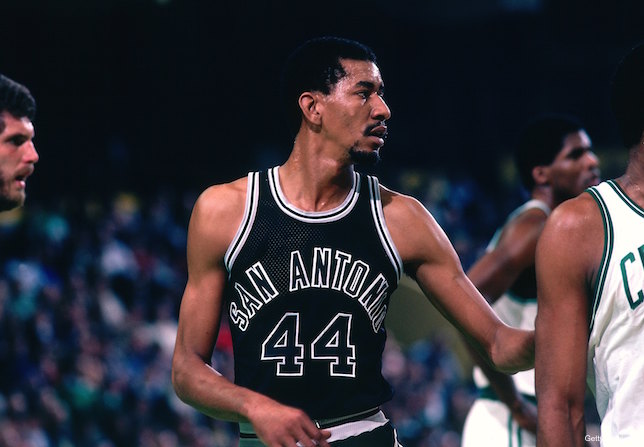
- Career Averages: 26.2 points, 4.6 rebounds, 2.8 assists, 1.2 steals
- Best Statistical Season (1977-78): 33.1 points, 5.2 rebounds, 2.6 assists, 1.4 steals, 1.0 blocks
- Championships: 0
- MVPs: 0
- Rookie of the Year: No
- All-NBA: 5x 1st Team, 2x 2nd Team
- All-Star: 9x, 1x All-Star MVP
- Leaderboards: 4x scoring leader, 4x FG-made leader
George Gervin was one of the most prolific scorers in league history but he was also one of the coolest players the game had ever seen. That’s why he was nicknamed The Iceman. But if you think that Gervin was a softy with an old-fashioned style, think again.
His signature shot was the finger roll and nobody executed it better. He took defenders to school nightly and even though they knew that the finger roll was coming, they still couldn’t stop it.
Over a seven-year period, the Iceman averaged 27.2, 29.6, 33.1, 27.1, 32.3, 26.2, and 25.9 points per game. Those are some of the best scoring seasons ever by any player in the league’s 72-year history.
Now, think for a moment about how he scored all of those points mostly without the three-point shot being in vogue as much as it is today. If Gervin played the game right now, it’s fair to speculate that he would have averaged more than 30 points in every single one of those seasons and perhaps averaged closer to 40 in two of them.
For his NBA career, he scored 20,708 points but if you include his time in the ABA, that total balloons to 26,595.
7. James Harden
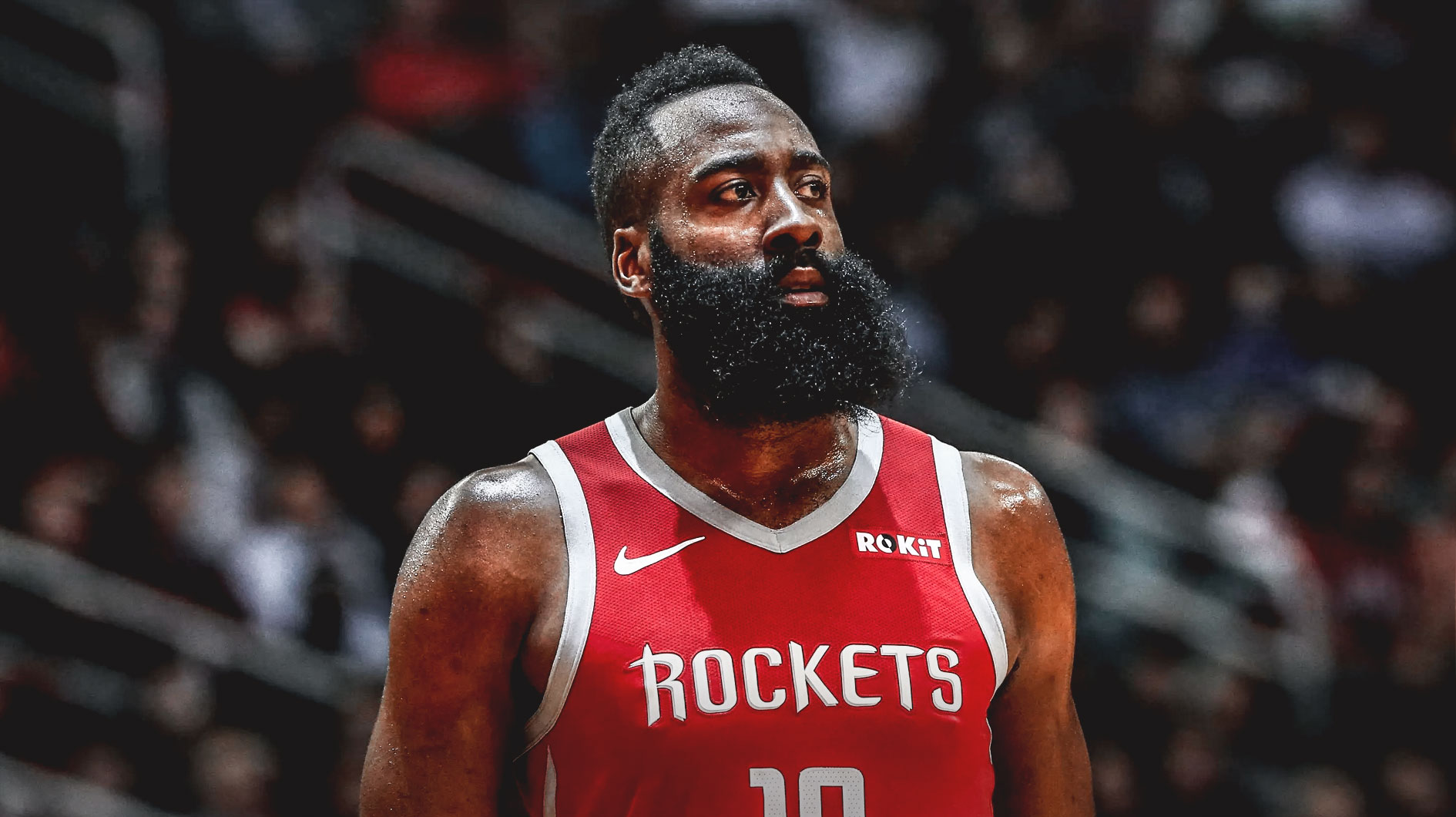
- Career Averages: 23.9 points, 5.2 rebounds, 6.2 assists, 1.5 steals
- Best Statistical Season: (2018-19 through 47 games played) 36.3 points, 6.7 rebounds, 8.1 assists, 2.1 steals
- Championships: 0
- MVPs: 1x
- Rookie of the Year: No
- Sixth Man of the Year: 1x
- All-NBA: 4x 1st Team, 1x 3rd Team
- All-Star: 6x
- Leaderboards: 1x scoring leader, 1x assists leader, 1x 3-point FG-made leader, 4x FT-made leader
Harden is enjoying the best statistical season of his career. The injury to Chris Paul forced the reigning league MVP to elevate his game and he has responded with aplomb.
For a time, Harden was averaging 40 points per game in 29 straight games. Only Elgin Baylor (33) and Wilt Chamberlain (515) have averaged 40 points in a span of 25 or more games. Additionally, he and Chamberlain are the only players to record back-to-back games of 55 points or more when Harden scored 57 and 58 points. His signature step-back three is one of the most unguardable moves the league has ever seen.
As good as he’s been the past few years, the biggest knock on the Beard is his playoffs performances. His disappearance in many of his team’s most crucial moments has left a bad taste in the mouths of most, if not all, pundits who are still iffy about giving Harden his proper place among the top five shooting guards in history. Before his career is over, perhaps even after this season, it’s not out of the realm of possibility that he will vault past the next two players on this list.
Since signing with the Rockets in 2012, he has never averaged less than 25.9 points per game and his playoffs average of 27.6 from 2013 onwards should help convince people that he’s not as absent-minded in the postseason as you might think.
Prior to his current hot-streak, Harden wasn’t even in my top 10 shooting guards list. I even ranked Tracy McGrady higher than him which was a mistake until I reviewed the numbers one more time. As you can see from my 50 greatest ranking, Harden is nowhere to be found but that could all change with a single postseason in which he plays consistently well especially in the biggest moments.
A good playoff run with indelible moments and a couple of series wins here and there would help tremendously. Winning isn’t everything but it helps change the narrative of a player especially one as maligned as Harden has been. That’s not too much to ask, right?
But the way in which Harden responded to adversity with his team lacking in firepower and manpower this season has made me a Beard-liever. Something tells me he’s not yet done changing people’s perception of him just yet.
6. Allen Iverson
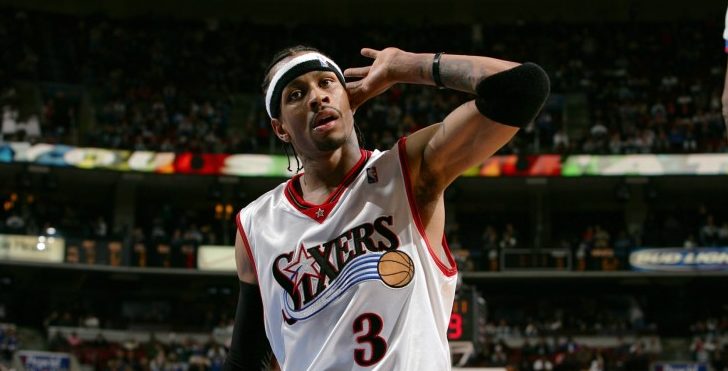
Jesse D. Garrabrant/Getty Images
- Career Averages: 26.7 points, 3.7 rebounds, 6.2 assists, 2.2 steals
- Best Statistical Season: (2001-02) 31.4 points, 4.5 rebounds, 5.5 assists, 2.8 steals
- Championships: 0
- MVPs: 1x
- Rookie of the Year: 1996-97
- All-NBA: 3x First Team All-NBA, 3x Second Team, 1x Third Team
- All-Star: 11x, 2x All-Star MVP
- Leaderboards: Scoring leader 4x, Steals leader 3x
Listed at exactly six feet, Allen Iverson is the shortest shooting guard on this list and perhaps ever. But don’t let his height, or lack of it, fool you. The Answer found ways to score and he did it better than almost anybody in the league during his playing days. He was the league’s scoring champ for four consecutive seasons, a feat surpassed only by Michael Jordan and Wilt Chamberlain who are head and shoulders taller than he is.
A dynamic scorer who elevated the crossover to heights unknown, Iverson was an artist who created opportunities to score for himself and his teammates. Four times in his career, Iverson was in the top 10 in assists, something that may surprise most people. At the other end of the floor, he was a handful, too leading the league in steals three times and was in the top eight in the category 10 times in his career.
Inasmuch as he attempted too many shots most nights, he was the primary, secondary and tertiary scoring option that the Philadelphia 76ers had when they were playoff and title contenders in the Eastern Conference during the early 2000s.
Who can forget the Sixers’ run to the Finals in the 2001 season? Facing the herculean task of defeating the Los Angeles Lakers who steamrolled over opponents with an unblemished 11-0 playoff record, Iverson and his crew gave the Tinseltown boys its only loss in the postseason in Game 1 of the championship round.
Though the Sixers eventually fell victim to Shaquille O’Neal’s hulking presence underneath, everyone finally recognized that Iverson was a unique talent, unlike any player we had ever seen.
5. Clyde Drexler
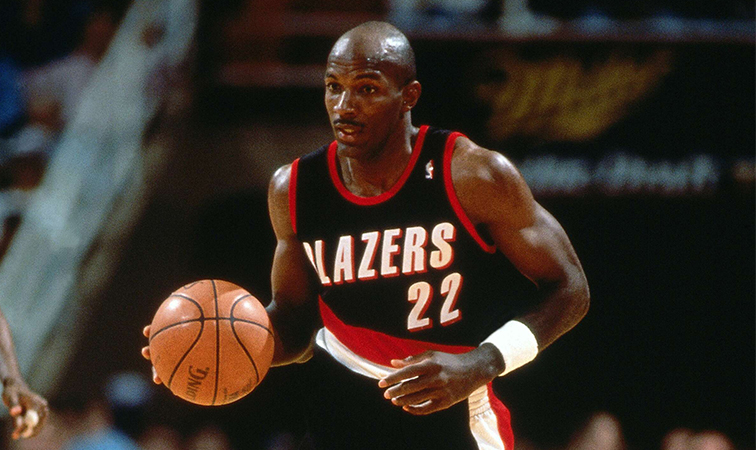
NBA.com
- Career Averages: 20.4 points, 6.1 rebounds, 5.6 assists, 2.0 steals
- Best Statistical Season: (1988-89) 27.2 points, 7.9 rebounds, 5.8 assists, 2.7 steals
- Championships: 1
- MVPs: 0
- Rookie of the Year: No
- All-NBA: 1x 1st Team, 2x 2nd Team, 2x 3rd Team
- All-Star: 10x
- Leaderboards: 0
Clyde “The Glide” Drexler flew to the air with the greatest of ease and stayed there until he could put the ball in the hole. The high-flying shooting guard had the misfortune of playing in the same era as Michael Jordan which somewhat diminished the perception of how good he was. He was unbelievable.
Drexler had an all-around game that was rarely seen in shooting guards. Not only could he score, but he could also help out on the boards and was an exceptional passer as well. He was the face of the mid-1980s to early 1990s Portland Trail Blazers, one of the most successful teams in franchise history. He carried them to the Finals twice but was turned back by the Detroit Pistons and the Chicago Bulls both times in 1990 and 1992.
Redemption came for Drexler when he was traded to the Rockets in the 1994-95 season where he played the younger, more athletic Anfernee Hardaway to a standstill in the Finals en route to winning his first and only NBA title. He averaged 21.5 points, 9.5 rebounds, 6.8 assists and 1.0 steals per game for the series.
In 1992, Drexler was immortalized as one of the greatest to play in his generation when he was named to the Dream Team alongside some of the most iconic names in basketball.
He scored 22,195 points, grabbed 6,677 rebounds, dished off 6,125 assists and swiped the ball 2,207 times in his career. After an unceremonious exit in the first round of the playoffs in 1998, Drexler decided to call it quits, ending a 16-year career that could have extended a few more seasons except he wanted to end his career on his own terms.
His 18.4 points, 4.9 rebounds, 5.5 assists and 1.8 steals per game certainly weren’t stats for someone who needed to retire.
4. Dwyane Wade
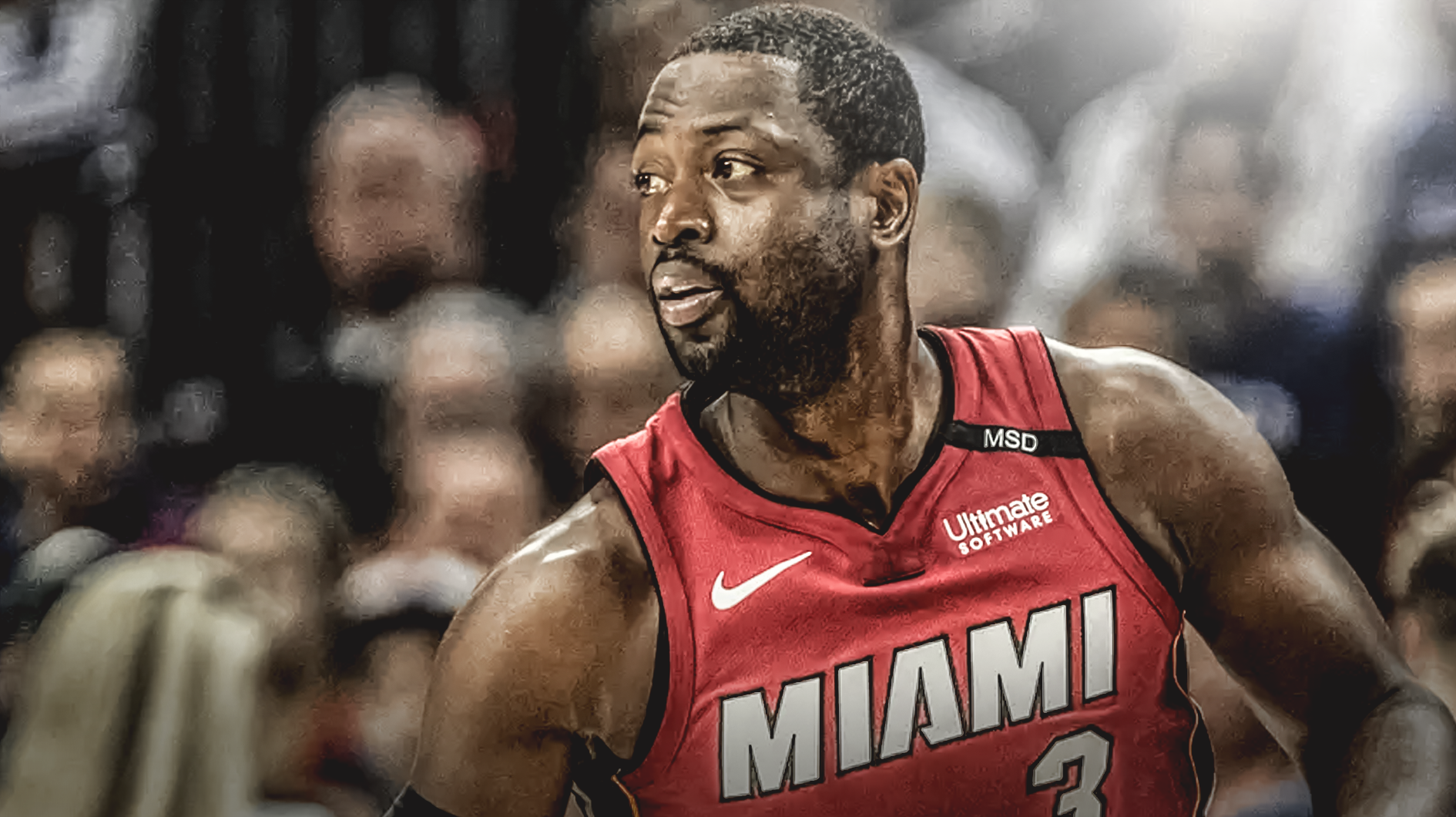
- Career Averages: 22.2 points, 4.7 rebounds, 5.5 assists, 1.6 steals
- Best Statistical Season: (2008-09) 30.2 points, 5.0 rebounds, 7.5 assists, 2.2 steals, 1.3 blocks
- Championships: 3
- MVPs: 0
- Finals MVP: 1
- Rookie of the Year: No
- All-NBA: 2x 1st Team, 3x 2nd Team, 3x 3rd Team
- All-Defensive Team: 3x 2nd Team
- All-Star: 12x, 1x All-Star MVP
- Leaderboards: 1x Scoring Champion
With his team down 0-2 to the Dallas Mavericks in the 2006 NBA Finals, Dwyane Wade willed the Miami Heat to a 4-0 sweep of the next four games, giving the franchise its first championship. As a third-year guard out of Marquette University, Wade showed that he was the next great shooting guard as he went home with the Finals MVP trophy despite playing with an all-time great center in Shaquille O’Neal in the lineup.
In that series, he averaged a Jordanesque 34.7 points, 7.8 rebounds, 3.8 assists, 2.7 steals and 1.0 blocks per game. Wade was so good in this series that when ESPN listed the greatest NBA Finals performances of all time back in 2011, they ranked this at No. 1. Then ESPN writer John Hollinger wrote that “Wade’s 33.8 PER (in the 2006 Finals) is easily the best of any Finals performer since the (ABA/NBA) merger.”
Wade virtually cemented his place in league history as a clutch performer and one of the greatest players ever with that performance on the NBA’s biggest stage.
But the Flash was just as good in the regular season, too.
For 10 seasons, Wade averaged 20 or more points and led the league in scoring in the 2008-09 season with a career-high 30.2 points per game. In six of those seasons, he was in the top 10 in scoring.
Wade, however, is anything but a one-dimensional player, excelling on the defensive end of the floor as well. He has the second-most shot blocks by a guard with 865 swats for his career so far with a career-high of 1.3 per contest. Additionally, Wade is pretty good at thievery, too, stealing the ball off his opponents an average of 1.6 a game.
As he winds down his career this season, Wade is garnering respect from his peers who recognize his place in NBA history.
3. Jerry West
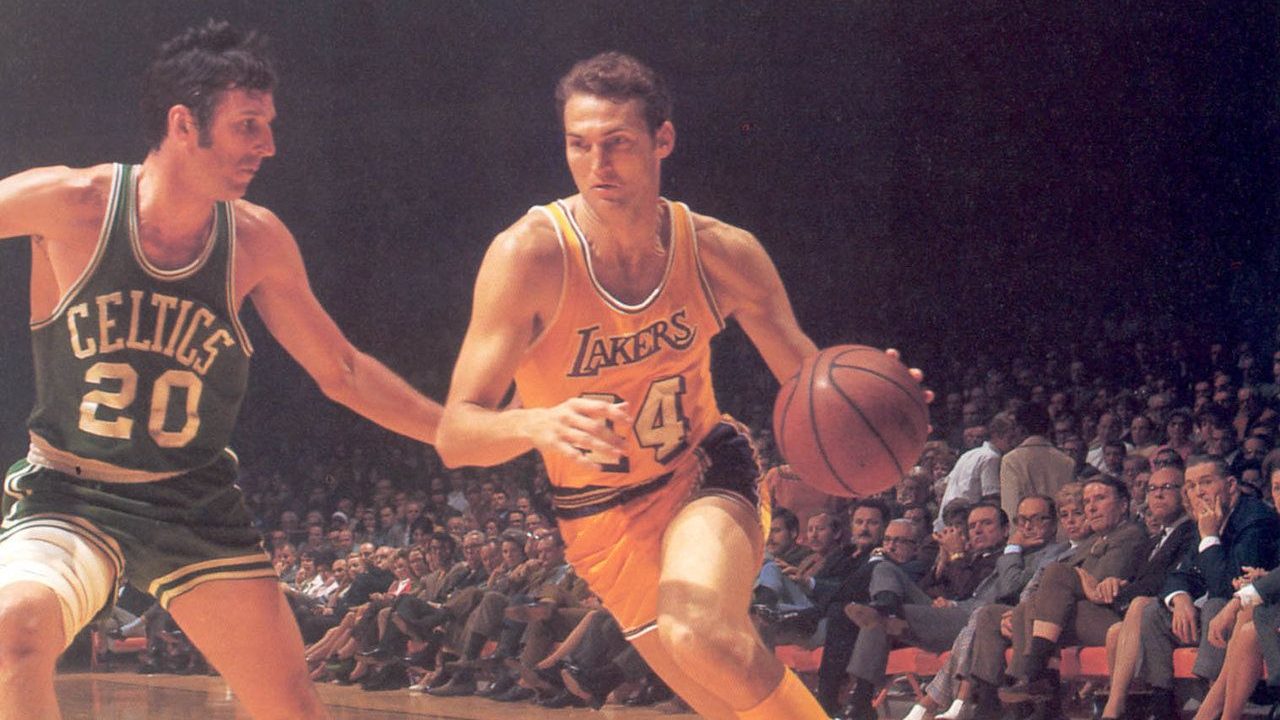
Getty Images
- Career Averages: 27.0 points, 5.8 rebounds, 6.7 assists
- Best Statistical Season: (1965-66) 31.3 points, 7.1 rebounds, 6.1 assists
- Championships: 1
- MVPs: 0
- Finals MVP: 1x
- Rookie of the Year: No
- All-NBA: 10x 1st Team, 2x 2nd Team
- All-Defensive Team: 4x 1st Team, 1x 2nd Team
- All-Star: 14x, 1x All-Star MVP
- Leaderboards: 1x Scoring Champion, 1x Assists Leader, 2x FTs-Made Leader
Time may have made fans and critics forget how good Jerry West was, not just as a two guard but as a player overall. Let me refresh your memory, folks.
In his 14 seasons in the league, West scored 20 or more points 13 times including four seasons in which he averaged 30.8, 31.0, 31.3 and 31.2 per game. He scored less than 25.0 points per game on only three occasions in his illustrious career.
But as good as he was in the regular season, Mr. Clutch was even better in the postseason. In 1964-65, he averaged an unheard of 40.6 points per game in 11 games after Elgin Baylor, the team’s high-scoring forward and fellow future Hall of Famer, went down with a career-threatening injury in the first round of the playoffs.
Though many recall his repeated playoffs failures at the hands of Bill Russell and his Boston Celtics, West could hold his head up high as he played his best in almost every game that he played them. The 1969 Finals saw West receiving the Finals MVP trophy despite losing to the Celtics in that series. His 37.9 points, 4.7 rebounds and 7.4 assists averages in the series showed that he was head and shoulders above everyone else including the players from the team opposing team.
In Game 7, West had a triple-double with 42 points, 13 rebounds and 12 assists but Boston won by only two points, 108-106. The ultra-competitive West will say to anyone willing to listen that he would gladly trade that Finals MVP trophy in exchange for that championship that year.
Nevertheless, West would win the coveted championship in 1972 with the Lakers having a phenomenal season. L.A. won a then-NBA record 69 wins which included a 33-game winning streak which to this day stands as the longest winning streak ever and that’s with West leading the team and still playing at the top of his game in his 12th season.
He was also a defensive stalwart as he was a member of the All-Defensive Team five times. In his last season, the NBA introduced a new category called steals and West averaged 2.6 per game as a 36-year old. Who knows how many he would have had in his career had the statistic been recorded from the beginning.
2. Kobe Bryant
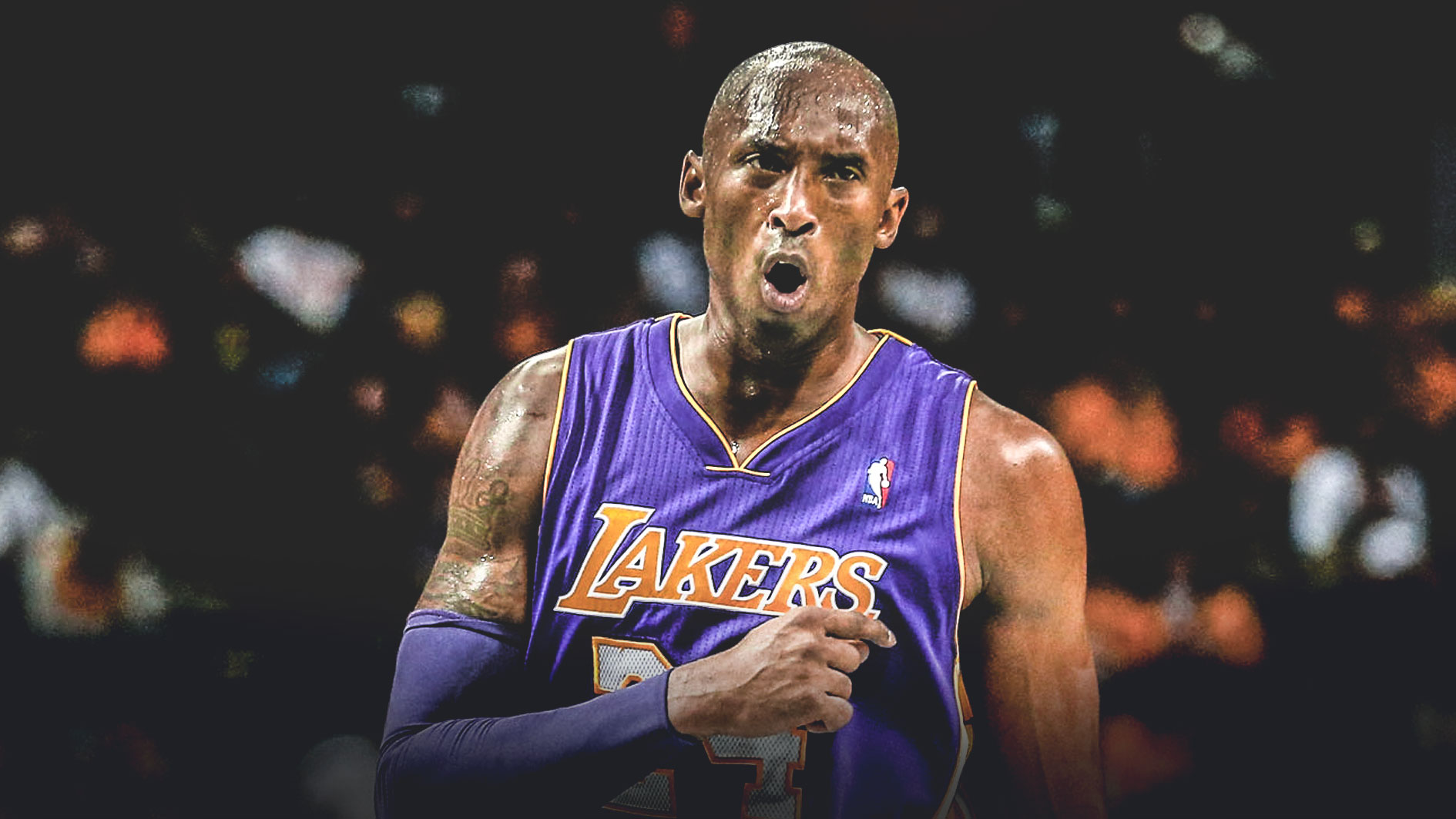
- Career Averages: 25.0 points, 5.2 rebounds, 4.7 assists, 1.4 steals
- Best Statistical Season: (2005-06) 35.4 points, 5.3 rebounds, 4.5 assists, 1.8 steals
- Championships: 5
- MVPs: 1
- Finals MVP: 2x
- Rookie of the Year: No
- All-NBA: 11x 1st Team, 2x 2nd Team, 2x 3rd Team
- All-Defensive Team: 9x 1st Team, 3x 2nd Team
- All-Star: 18x, 4x All-Star MVP
- Leaderboards: 2x Scoring Champion, 3x FGs-Made Leader, 2x FTs-Made Leader
Since his first year in the NBA, Kobe Bryant wowed fans every moment he stepped on the court.
One of the greatest scorers witnessed in the league, Bryant scored more than 22 points per game 15 times in his 20-year career. That’s a standard of excellence that’s never been seen in the league before especially for a perimeter player. Three times he averaged more than 30 points per game, leading the league in scoring twice. 13 times in his career he scored more than 25 points per night.
In the 2005-06 season, he averaged a career-high 35.4 points per game. That is one of the highest scoring averages by any player, in any era ever. This was the monumental season in which he had a game for the ages. Against the Toronto Raptors in January of 2006, the Black Mamba would be unleashed as he scored an awe-inspiring career-high 81 points. That’s the second-highest scoring game in NBA history behind Wilt Chamberlain’s 100-point game way back in 1962.
With 33,643 points in his career, Bryant is the Lakers all-time leading scorer and third all-time in career scoring behind only Kareem Abdul-Jabbar and Karl Malone.
Bryant was also one of the league’s best defenders, being named to the All-Defensive Teams 12 times in his career. He took on the best perimeter players of the opposing teams and relished the opportunity to guard them with no questions asked. His competitive spirit was such that he could do no less.
The five-time NBA champion won a ring three consecutive seasons with him and Shaquille O’Neal leading the Lakers from 2000-2002. He would win two more without the legendary big man in back-to-back seasons (2008-09 to 2009-10). His lone MVP Award came in 2007-08 even though he more than deserved to have received the award the two seasons prior.
In the last game of his career, Bryant scored 60 points at Staples Center as Lakers fans and teammates encouraged him to shoot every time he had the ball in his hands. Despite missing a number of shots early, he would heat up in the fourth quarter and carry the Lakers to victory against the Utah Jazz whom he outscored in the fourth quarter 23-21. It was the most scintillating game of the year though the result had no bearing on the Lakers season. This performance went into the record books as he became the oldest player to score 60 points in a game.
As polarizing as he may have been for much of his career, no one can deny that Bryant is a champion, a future Hall of Famer and one of the greatest players ever.
1. Michael Jordan
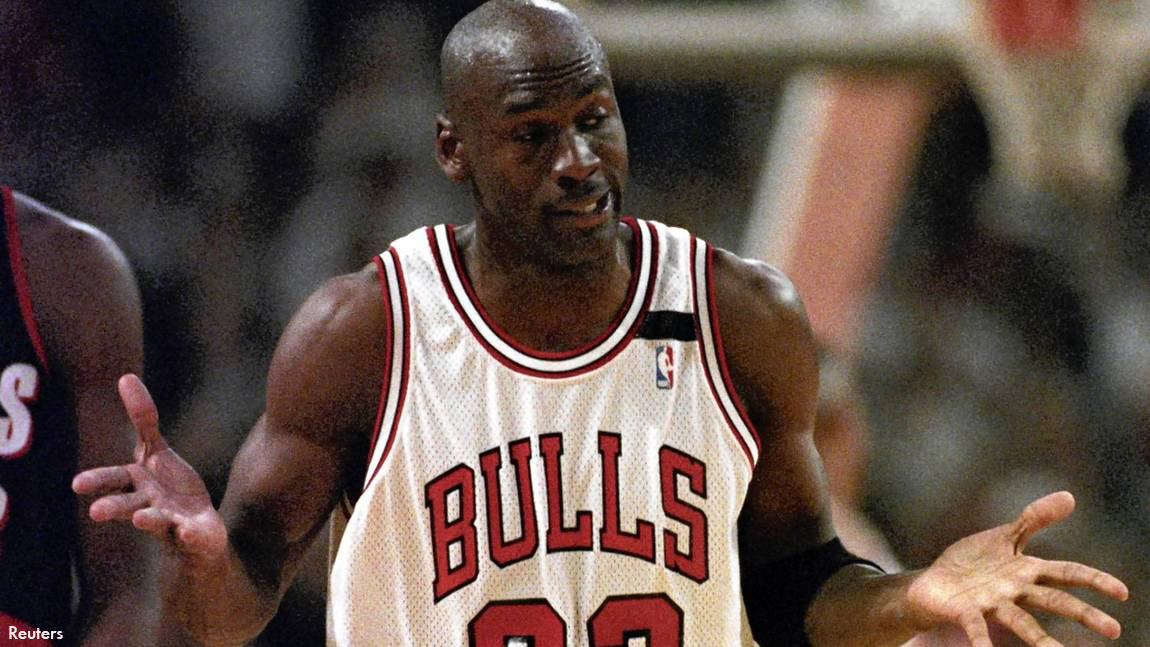
Reuters
- Career Averages: 30.1 points, 6.2 rebounds, 5.3 assists, 2.3 steals
- Best Statistical Season: 35.0 points, 5.5 rebounds, 5.9 assists, 3.2 steals, 1.6 blocks
- Championships: 6
- MVP: 5x
- Finals MVP: 6x
- Defensive Player of the Year: 1x
- Rookie of the Year: 1984-85
- All-NBA: 10x 1st Team, 1x 2nd Team
- All-Defensive Team: 9x 1st Team
- All-Star: 14x
Leaderboards: 10x Scoring Champion, 3x Steals Leader, 10x FGs-Made Leader, 2x FTs-Made Leader
Was it ever a question who would be no. 1 on this list? If there ever was a shooting guard who dominated the league unlike any who came before him, it’s Michael Jordan. Not only is he at the top of his position all time, most fans and critics alike consider him as the greatest player to ever walk the earth.
While researching for this piece, it was astounding to see how Jordan’s numbers were astronomically better when compared side-by-side with the rest of the players on this list. His were just a cut above everyone else and then some.
Averaging 30 points per game is quite the accomplishment for players in any era but for His Airness, that was a regular walk in the park. He averaged more than 30 points per game eight times. His 37.1 points per game average in 1986-87 is the highest ever by any player not named Wilt Chamberlain.
In his next full seasons, he was at 35.0, 32.5, 33.6, 31.5, 30.1, 32.6 and 30.4. I said “full” because in his 17-game comeback from playing baseball in 1994-95, he averaged a mere 26.9. He led the league in scoring an NBA record 10 seasons while tying Chamberlain for consecutive seasons leading all players with seven.
In 1997-98, he was just 0.4 points away from averaging an even 30. On two other occasions, he averaged 28.7 and 28.2, with the latter being his average as a rookie. No biggie for a first-timer, right? As a 38-year old for the Wizards, he averaged 22.9 per game. At 40, he was still at 20.0 a night.
And I’m just warming up here. Jordan was at or near the top of almost every metric you can find when it comes to winning and player performance.
Jordan led the league in PER seven times in his career, third-most behind Abdul-Jabbar (9) and Chamberlain (8). He’s the only guard in the top five and West only made it to the top 10 as he was tied with three other players at two apiece. In the top 10 PER seasons of all time, Jordan has four of them with the highest at 31.71 (1987-88) which is third overall behind only Wilt Chamberlain’s 31.82 and 31.74.
In Win Shares, Jordan ties Abdul-Jabbar at nine seasons. In Value Over Replacement Player, he’s second to LeBron James (9) at seven, and in Box Plus/Minus he’s fourth with five seasons leading the league behind James, Abdul-Jabbar and David Robinson. Almost every guard that you find in the top 10 in these metrics are either at the lower end of the list or are nowhere to be found. That’s how much better Jordan was compared to his peers at the position.
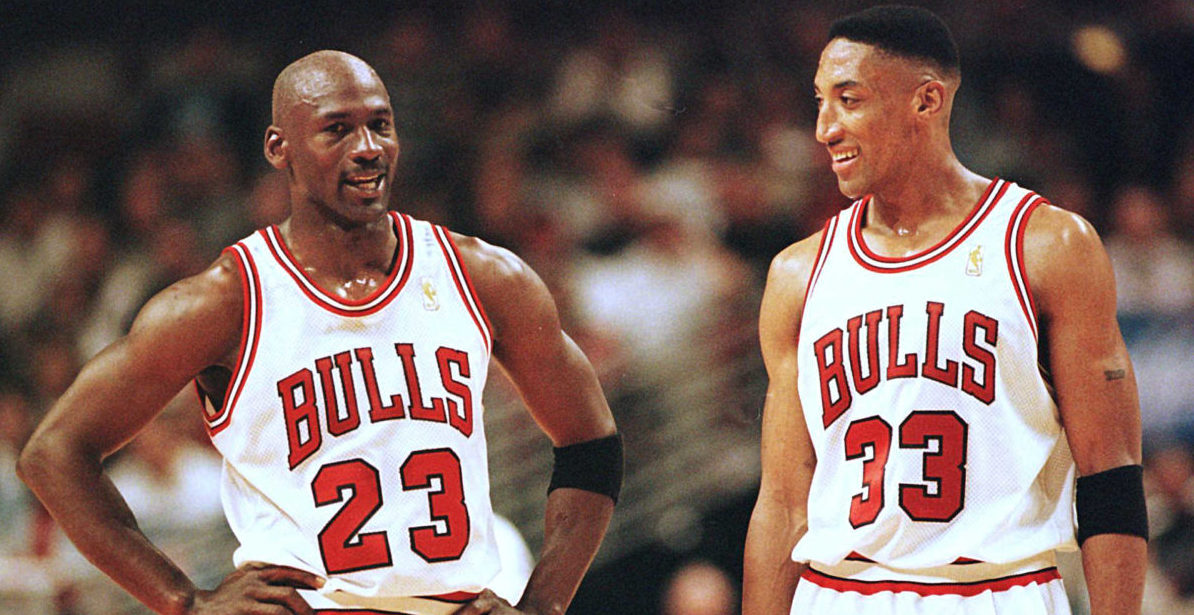
Getty Images
At the defensive end, Jordan was a beast. He has the most blocks ever by a guard with 893 for his career and an average of almost a block per game. He steals the ball more than two per game for his career (2.3) and he is second only to John Stockton with 2,514 total. He was the first player to achieve at least 200 steals and 100 blocks in a season and he did it twice (1986-87, 1987-88). Only Scottie Pippen and Hakeem Olajuwon are in this distinguished company.
For his defensive efforts in 1987-88, Jordan won Defensive Player of the Year, an award normally given to centers and forwards and rarely bestowed on a guard and none of the others are on this list. He was also a nine-time Defensive First Team member, too.
Jordan was also a winner at the highest level, winning the Larry O’Brien trophy six times and the Finals MVP six times as well. His Bulls teams of the 90s had a three-year run of 72, 69 and 62 wins. Twice during that span, he won two of his five Maurice Podoloff trophies as the league’s MVP.
I haven’t even mentioned his playoffs performances yet and the clutch shots he made no matter whether it was the regular season, the postseason or the Finals. None have performed at the highest level and delivered as often as Jordan has.
For these reasons and more, he is the greatest shooting guard in NBA history.
The post The top 10 NBA shooting guards of all time: Where does James Harden rank? appeared first on ClutchPoints.






